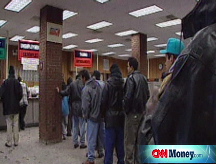Get ready for more pain ahead
Forget about the credit crunch and falling house prices. The job market is the biggest economic problem -- and it's likely to get worse before it gets better.
NEW YORK (CNNMoney.com) -- There is no longer any doubt about the biggest problem facing the economy: the job market.
Economists believe the recession is likely to get worse until the spiraling job losses and unemployment rate start to improve.
Record low mortgage rates won't lead to higher home values and increased home sales as long as 500,000 people a month are losing their jobs.
Rising unemployment will probably make banks even less willing to lend and also lead to increased defaults on a large range of existing loans.
And with more consumers losing, or worried about losing, their jobs, that should lead to a further pullback in spending. In turn, that will make it tougher for companies to increase their profits, which could lead to even more stock market losses.
If all that weren't bad enough, economists worry that that this will put more pressure on employers to lay off even more workers -- prompting the proverbial vicious circle that can make it so hard to get out of a bad economic downturn.
"That's behind the difficulty in seeing a sustainable recovery ahead," said Lakshman Achuthan, managing director of Economic Cycle Research Institute.
With that in mind, there's a very good chance that there could be more months ahead where the economy sheds more than 500,000 jobs.
"When you have an economy in a free-fall, you have to expect job losses of this magnitude," said Rich Yamarone, director of economic research at Argus Research. "The really bad news is that there's no reason to expect this trend to reverse."
Even the people who have jobs are suffering. According to a recent survey by the Society for Human Resource Management, more companies are reporting that they are cutting pay of their employees in response to the difficult environment.
In addition, the average work week has been falling steadily during the past four months. A record 8 million workers that want full-time employment have only been able to get part-time jobs, according to the government's December labor report. That's up 37% from the total of so-called underemployed workers in August.
Pay hikes will be at best modest this year for many employees lucky enough to get increases. A survey by consultant Hewitt Associates found raises will be less than 3% for the first time in the study's 32-year history.
State and local governments are also making tough choices because of the recession, with many reporting big cutbacks in services and suggesting new taxes that could further hurt cash-strapped consumers.
Currently, 43 states have an estimated combined budget deficit of about $100 billion. With many states required by law to balance their budgets, those governments are looking at everything from reduced garbage collection and shortened school years to new taxes on everything from soda to music downloads.
And it could get worse before it gets better for states and local governments. Some retail experts expect a record number of stores to close this year, with thousands of closings beyond those already announced. Vacant storefronts and dead malls can further depress a community's property values and tax collections.
That's why some think that the only way out of the recession is to firmly address the issue of rising unemployment. Tig Gilliam, chief executive of Adecco Group North America, a unit of the world's largest employment firm, said many of his clients tell him they're preparing to make additional job cuts.
Gilliam added that it's not the credit crunch that is causing them to cut back, but the reduced sales due to weak consumer demand, which has largely been driven by job losses and job worries.
"It's not a housing problem. It's not a financial services problem. It's spread across the landscape," Gilliam said. "And it's a lack of confidence of the 92.8% of people who are employed."
Are you unemployed and using unconventional methods to find work? Tell us about it, and you could be included in an upcoming story. ![]()





